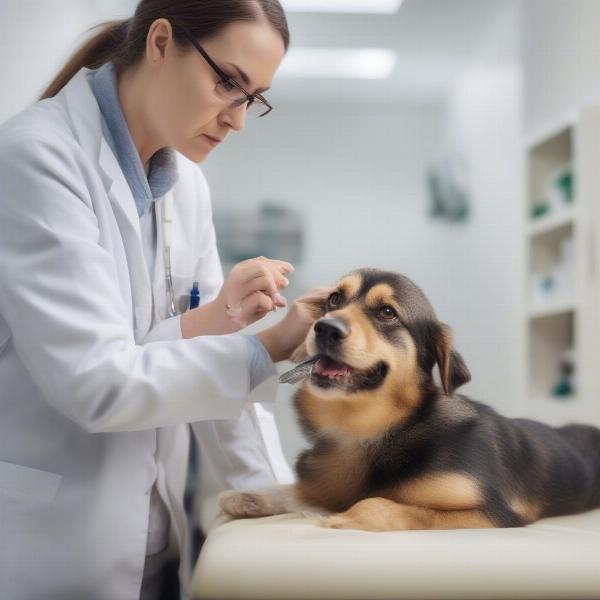Urinary dog food plays a vital role in maintaining your dog’s bladder health. Choosing the right urinary dog food can help prevent and manage urinary tract issues, such as bladder stones and infections. This comprehensive guide will explore the importance of urinary dog food, different types available, and how to choose the best one for your furry friend. We’ll also delve into the causes of urinary problems, symptoms to watch out for, and how dietary changes can make a difference.
Understanding Urinary Tract Issues in Dogs
Urinary problems are common in dogs, and can range from relatively minor infections to more serious conditions like bladder stones. Common causes include bacterial infections, crystal formation in the urine, anatomical abnormalities, and even stress. Symptoms can vary, but frequent urination, straining to urinate, bloody urine, or accidents in the house can all indicate a problem. It’s crucial to consult your vet if you notice any of these signs. Early diagnosis and treatment are essential for preventing more severe complications.
How Urinary Dog Food Helps
urinary care dog food is specially formulated to address the underlying causes of urinary tract problems. These diets often control mineral levels, particularly magnesium, phosphorus, and calcium, which can contribute to crystal formation. They also often encourage water intake, helping to dilute urine and flush out the urinary tract. Some formulas include ingredients that help maintain a healthy bladder lining and reduce inflammation.
Choosing the Right Urinary Dog Food
Selecting the right urinary dog food requires careful consideration of your dog’s individual needs. Factors like breed, age, size, and overall health should be taken into account. Always consult with your veterinarian before switching your dog to a urinary diet. They can diagnose the specific urinary issue and recommend the most appropriate food.
Types of Urinary Dog Food
hill’s urinary care dog food comes in various forms, including dry kibble, canned wet food, and even prescription diets. Dry kibble is often the most affordable option, while wet food can be more appealing to picky eaters. Prescription diets are typically recommended for more serious cases and require a veterinarian’s authorization.
 Veterinarian examining a dog for urinary tract issues
Veterinarian examining a dog for urinary tract issues
What to Look for in a Urinary Dog Food
When choosing a urinary dog food, look for formulas that are:
- Veterinarian-recommended: Always prioritize foods approved by veterinary professionals.
- Specifically formulated for urinary health: Ensure the food is designed to address urinary tract issues.
- Complete and balanced: The food should provide all the essential nutrients for your dog’s overall health.
- Palatable: Choose a food your dog enjoys to ensure they will eat it consistently.
Beyond Diet: Supporting Urinary Health
While urinary dog food is essential, other factors contribute to maintaining urinary health. Providing fresh water at all times is crucial for flushing out the urinary tract. Regular exercise can also help prevent urinary problems and encourage healthy urination habits.
Conclusion
Choosing the right royal canin urinary dog food can significantly improve your dog’s urinary health and overall well-being. Consulting your vet for a proper diagnosis and tailored dietary recommendations is essential. By combining the right diet with lifestyle adjustments, you can help your dog maintain a healthy and happy urinary tract.
FAQs
-
What are the signs of urinary problems in dogs? Answer: Frequent urination, straining to urinate, bloody urine, accidents in the house, and excessive licking of the genitals can indicate urinary issues.
-
How long should a dog stay on urinary food? Answer: The duration depends on the specific condition. Some dogs may need urinary food for life, while others may only require it for a short period. Consult your vet for guidance.
-
Can urinary dog food prevent bladder stones? Answer: Yes, certain types of dog food urinary can help prevent bladder stone formation by controlling mineral levels in the urine.
-
Is all urinary dog food the same? Answer: No, different brands and formulas address various urinary issues. Some are for dissolving struvite stones, while others target calcium oxalate stones.
-
Can I give my dog urinary treats? Answer: It depends on the treat and your dog’s condition. Consult your vet before introducing any new treats.
-
What if my dog won’t eat urinary food? Answer: Try gradually mixing the new food with their current food. If the problem persists, consult your vet for alternative options.
-
Can I give my healthy dog urinary dog food? Answer: It’s generally not recommended to give healthy dogs urinary food unless advised by your vet.
Related Articles on ILM Dog
About ILM Dog: ILM Dog is your trusted resource for expert advice on dog care and nutrition. We offer comprehensive information on various topics, including breed selection, health care, training, nutrition, grooming, and accessories. Whether you’re a new dog owner or a seasoned expert, we’re here to help you provide the best care for your canine companion. Contact us at [email protected] or +44 20-3965-8624 for personalized guidance.